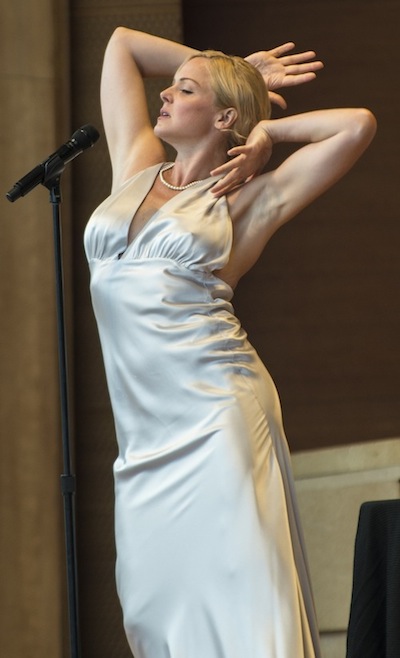A night of “Sins” and Schubert shows versatility of Kalmar, Grant Park Orchestra

A perfect summer evening and an eclectic program attracted a large and enthusiastic audience to the Grant Park Music Festival Wednesday night, with principal conductor Carlos Kalmar in great form and vocal soloist Storm Large equally commanding in a performance of Kurt Weill’s The Seven Deadly Sins.
The Weill was the composer’s last collaboration with Bertold Brecht and a swan song of the period they personified. It is politically and socially situated in the dark year it was premiered (1933) and its irony is clothed in some of Weill’s richest music. It was written as a ballet but has found a place as a concert piece for a dramatic soloist with orchestra. The story line is negligible but has arresting relevance to current events with its tale of a migrant gold-digger in search of money to send back to home and family.
Storm Large is best known for her association with the pop group Pink Martini. Her voice and personality are perfectly suited to the Brecht/Weill idiom. Her clear tone and excellent diction made the most of the text, although there was an occasional pop in the amplification of her hard consonants. There was also a tendency to over-amplify the male vocal quartet, which provided context and sarcastic commentary on her peregrinations. Still, the stylish performances of tenors Hoss Brock and John Concepcion, baritone Ron Watkins, and bass Wilbur Pauley, as “Family” more than made up for that technical issue.
Kalmar directed the large brass and wind-heavy ensemble through the wide range of dynamics and emotions underpinning the vocal lines. Notable were the brassy opening of “Lust “and the vigorous rhythms in “Covetousness.” The conductor made the most of this full-bodied, foreboding work.
The program was presented without intermission and there was only the briefest of intervals as the stage was reset for Schubert’s “Unfinished” Symphony. The quick change to the early Romantic idiom was a bit jarring, but Kalmar seemed to switch styles effortlessly. His take on the Schubert was rhythmically taut and well-articulated in the first movement and organically flowing in the second, with sensitive solos from flute, clarinet and oboe.
Then, as if to provide a finale to the symphony, and with barely a heartbeat between them, the conductor launched right into the pyrotechnics of Strauss’s “Dance of the Seven Veils” from Salome. This was another jarring juxtaposition but the performance was stylish, dynamic and rhythmically flowing. Kalmar again showed his ability to smoothly move between classical genres, bringing the short but substantial concert to a refreshing conclusion.
Posted in Performances


